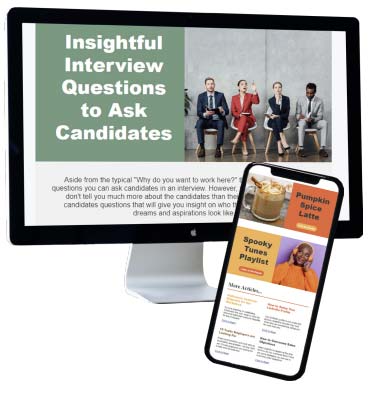Before You Go!
Sign up for our newsletter - which features professional templates, job market updates, articles, playlists, recipes, and more, sent directly to your inbox!


No matter where you work, professionalism in the workplace is a vital part of success in any job. While some companies are more casual than others, there are certain rules of conduct that every professional should follow. Here are some business etiquette tips that are guaranteed to impress your boss, improve relationships with coworkers and help you succeed in your career.
Put away your gadgets in meetings. You may not think it's noticeable when you're looking at your screen, but it is when everyone else in the meeting is paying attention. When it comes time for meetings, take a break from the screens by silencing and putting away your phone, and closing your laptop. When everyone unplugs and gives their full attention to the matter at hand, meetings are much more productive.
Mind your manners. Don't forget all those lessons your mama taught you '“ good manners are still important in the business world, and how you treat others says a lot about you. Say please and thank you, don't interrupt when others are speaking, clean up your dishes in the break room and practice good table manners. These common-sense rules are typically not associated with 'business'? etiquette, but it's crucial to be polite and socially aware.
Email is public information. Anything you put in an email, instant message or any other form of digital communication can be traced back to you, so don't send anything that you wouldn't want your entire company to see. There are countless embarrassing stories from employees that have had their gossipy emails or chat logs leaked to the entire office, so don't take the risk of ruining the relationship with your coworkers or getting in trouble with your boss.
Share the spotlight in meetings. Be tactful and socially conscious in meetings, especially when it comes to the 'Questions'? segment. Give everyone a chance to speak instead of dominating the discussion, and be aware of how long the meeting is supposed to run so you're not holding everyone up. It's especially helpful to consider who will benefit from your questions. If the majority of your questions have the word 'I'? in them, maybe it's best to send a follow-up email to the presenter after the meeting.
Keep your workspace clean. Some desks are more organized than others, but there's a definite difference between work-related clutter and absolute chaos. While everyone has their own unique system of organization, your workspace is a reflection of you. Buy some inexpensive folder organizers to sort your paperwork, designate a drawer for certain items or just create your own system that makes your desk look a bit less chaotic. More importantly, don't leave dirty dishes or trash lying around '“ paperwork is inevitable, but you never want to look like a slob.
Practice your people skills. When it comes to people skills, show, don't tell. We all say that we're good at working with others, so telling someone that you have good people skills really doesn't impress anyone. Instead, just try to be better at them by being polite and considerate.
Perfect your presentations. Everyone has to give a presentation at one point or another, whether it's for a boss, client or meeting. No matter what your job entails, learning how to speak to an audience helps you learn how to present yourself and your ideas. Certified speaking professional and executive coach Shawna Schuh breaks her presentation skills down into four main tips:
Whether you're searching for real estate jobs at J Williams Staffing or simply looking to improve your current career, practicing business etiquette is fundamental for professionalism in the workplace. To learn more business etiquette tips, interview tips and other workplace resources, visit the JWilliams Staffing blog.